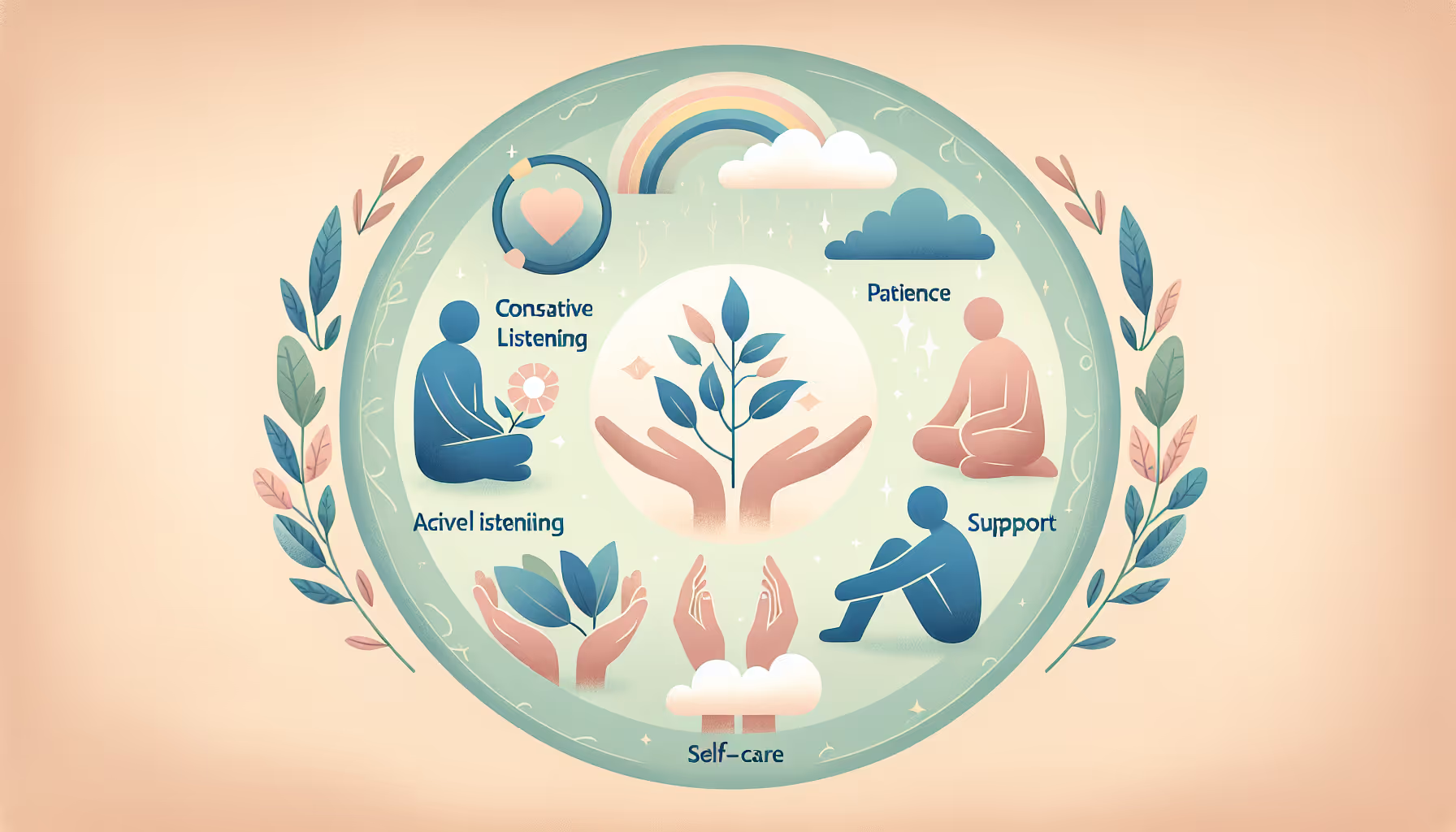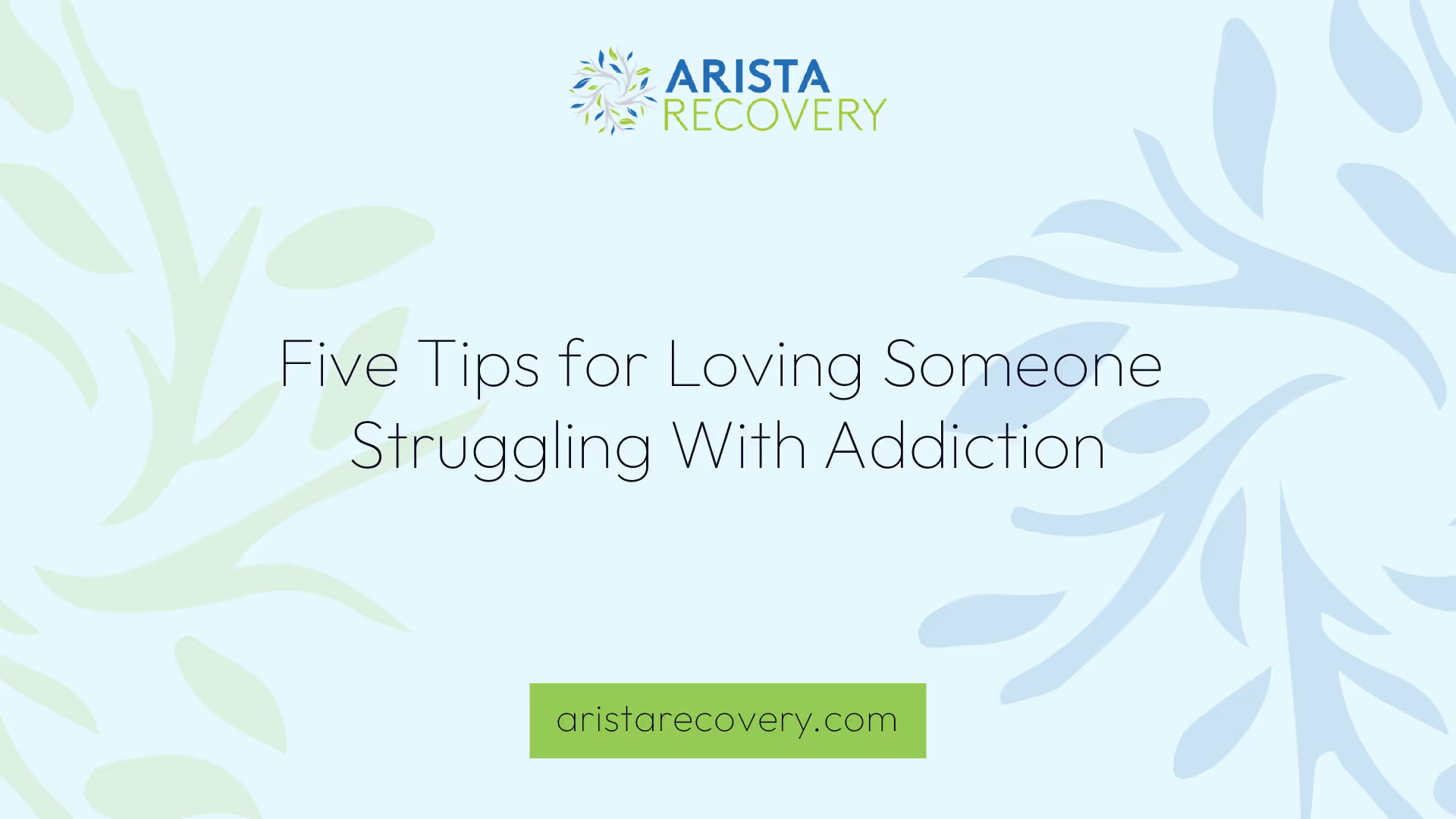
Understanding Addiction
Before diving into a discussion on the five tips for loving someone struggling with addiction, it's crucial to first understand the nature of addiction. This understanding will provide the necessary context for the subsequent tips and strategies discussed.

Complex Nature of Addiction
Addiction is a complex and often misunderstood issue that affects both the brain and behavior of those who experience it. It's not just a matter of willpower or moral failing as it's often portrayed, but rather a complex interplay of biological, psychological, and environmental factors.
At the heart of addiction lies the brain's reward system. When an individual engages in pleasurable activities, the brain releases a neurotransmitter called dopamine. This neurotransmitter is associated with feelings of pleasure and motivation. When substances that cause addiction are used, they hijack this reward system, causing a surge of dopamine that leads to intense feelings of pleasure. Over time, the brain adjusts to these surges by producing less dopamine or reducing the number of receptors that can receive signals, leading to the need for more of the substance to achieve the same effect, thus fostering dependence and addiction.
Impact of Addiction on Individuals
Addiction has far-reaching consequences that extend beyond the individual struggling with the substance use disorder. It can have negative impacts on mental health, social relationships, personal safety, and financial well-being. Substance use and abuse can cause a significant amount of stress and damage, whether the substance in question is alcohol, illegal drugs, or prescription medications.
Moreover, addiction affects every aspect of a person's life, including psychological, emotional, relational, and physical aspects. When concerned about a loved one who may be suffering from a substance use disorder, it's important to look for signs of addiction across all of these domains.
Understanding the complex nature of addiction and its impacts on individuals can help you approach a loved one struggling with addiction with empathy and compassion. The subsequent sections of this guide will provide practical tips and strategies for effectively supporting a loved one through their journey to recovery.
Recognizing Signs of Addiction
Recognizing the signs of addiction in a loved one is a crucial step towards helping them navigate their path towards recovery. Addiction affects every aspect of a person's life, including psychological, emotional, relational, and physical aspects. Signs of addiction should be looked for across all of these domains.
Emotional Signs of Addiction
Emotional signs of addiction can often be subtle, but they can offer important clues into a person’s struggle with substance abuse. These signs might include emotional volatility, erratic behavior, and a distinct change in emotional demeanor. For instance, a loved one struggling with addiction might exhibit increased irritability, mood swings, and emotional instability. They might also show signs of anxiety, depression, and other mental health issues. It's important to remember that these signs can vary widely among individuals and might not always be directly linked to substance use. However, if these signs persist or worsen over time, they could indicate a serious problem.
Physical Signs of Addiction
Physical signs of addiction can be more readily apparent. These might include noticeable changes in weight, skin health, eye clarity, and overall physical appearance. More severe signs could include tremors, slurred speech, poor coordination, and unexplained injuries. It's worth noting that physical signs of addiction can be more severe due to the effects of alcohol and drugs on the body. As such, these signs should not be ignored and may necessitate immediate attention and potential help.
In conclusion, recognizing the emotional and physical signs of addiction is a key part of supporting a loved one struggling with substance abuse. It's important to approach this process with compassion and understanding, as it can be a difficult experience for everyone involved. Remember, it's always okay to seek professional help if you're unsure about what to do or if you feel overwhelmed by the situation.
Communicating with a Loved One
When a loved one is struggling with addiction, effective communication becomes a crucial part of their support system.
Importance of Compassionate Communication
Addiction is often stigmatized in society, leading many individuals facing addiction to anticipate criticism, insults, and rejection. It's imperative to counter this negativity with compassion and understanding, even if you don't agree with their actions.
The language used in communicating with individuals with addiction matters significantly. It's suggested to avoid terms like "clean" or "addict," and instead use person-first language to avoid stigmatizing them.
Listening is a fundamental aspect of communication. Allow them to speak without interruptions or criticisms, and remember they are individuals with interests and desires beyond their addiction [3].
Consistency in words and actions is vital. Ensuring your actions align with your words can effectively communicate support and boundaries.
Offering support and love, non-judgmentally and unconditionally can be vital for someone struggling with addiction to feel safe and supported in their recovery journey.
Educating Yourself about Addiction
Before attempting to support a loved one struggling with addiction, it's essential to educate yourself about the disorder. Understanding addiction and the stigma surrounding it can help in providing better support and communication [3].
Creating healthy boundaries, such as not enabling the behavior, can be crucial when supporting a loved one with addiction.
Encouraging open communication and expressing concern with empathy can help individuals with addiction feel heard and supported in their recovery journey.
Educating yourself about addiction and available resources can empower you to provide effective support and guidance to a loved one facing addiction challenges.
Seeking help from professional support services, such as mental health professionals or addiction counselors, can provide valuable assistance and guidance for both the individual struggling with addiction and their loved ones.
In conclusion, understanding addiction and practicing compassionate communication are two of the five tips for loving someone struggling with addiction. The next sections will delve into setting boundaries, seeking professional help, and self-care for those affected, rounding out the set of essential tips.
Supporting a Loved One
When a loved one is coping with addiction, it can be challenging to know how to best support them. It is crucial to approach the situation with empathy and understanding while also setting healthy boundaries and seeking professional help when necessary.
Setting Boundaries
Establishing healthy boundaries is a crucial step when supporting a loved one struggling with addiction. These boundaries, such as not enabling the behavior, can be instrumental in their recovery process. Enablers can change their behaviors by detaching and entering their own recovery program to understand why they feel the need to enable and what they are receiving from helping another person [5].
Creating these boundaries does not mean withdrawing love or support. Instead, it allows the person struggling with addiction to experience the consequences of their actions, which can be a powerful motivator for change. Remember, boundaries are not about punishing the individual but about protecting your own mental and emotional health while also encouraging them to seek help.
Seeking Professional Help
Supporting a loved one through addiction is not something one should face alone. Seeking help from professional support services, such as mental health professionals or addiction counselors, can provide valuable assistance and guidance for both the individual struggling with addiction and their loved ones.
These professionals can provide a variety of services, including individual and group therapy, medication management, and comprehensive treatment programs. In addition, they can offer education about addiction and recovery, which can empower you to provide effective support and guidance to your loved one.
Remember, it's not your responsibility to fix your loved one. Addiction is a complex disease that requires professional intervention. By setting boundaries and seeking professional help, you can provide the support your loved one needs while also taking care of your own health and wellbeing.
Self-Care for Those Affected
When dealing with a loved one struggling with addiction, it's vital not to overlook the importance of self-care. The emotional toll can be significant, and caring for oneself is essential to be able to support their loved one effectively.
Importance of Self-Compassion
Loved ones of addicts may try to save them, clean up their messes, and carry the burden of their addiction. However, it's crucial to remember that only the individual struggling with addiction can instigate the necessary change. Prioritizing self-care and maintaining mental and physical health is critical as it enables one to assist their loved one effectively when they are ready.
Practicing self-compassion is a key part of this process. This involves accepting personal imperfections and hardships as an inherent part of life. Self-compassion can help alleviate feelings of guilt, shame, and regret often experienced by loved ones of addicts. It aids in soothing negative emotions and promoting emotional well-being [6].
Seeking Support and Assistance
Addiction is often referred to as a family disease due to the severe emotional ups and downs, turmoil, and suffering felt not only by the addicted individual but also by everyone close to them. Parents and partners of individuals suffering from addiction often experience immense feelings of guilt, worry, and confusion caused by addiction [6].
Enabling an addicted loved one by removing or softening the adverse consequences of their negative behavior can perpetuate their substance abuse. Setting healthy boundaries and allowing them to face the repercussions of their actions can encourage them to recognize the need for help and preserve the well-being of both individuals.
In this challenging journey, seeking help and support from trusted friends, family members, support groups, or therapists is essential. Recognizing the need for assistance and taking proactive steps are crucial in managing the impacts of a loved one's addiction effectively.
It's important to remember that self-care isn't selfish. It's a necessary component of the process when loving someone struggling with addiction. By taking care of oneself, one can provide the best possible support to their loved ones.
References
[1]: https://theridgeohio.com/blog/self-care/
[2]: https://recoverycentersofamerica.com/blogs/identifying-signs-of-addiction-in-a-loved-one/
[3]: https://www.verywellmind.com/how-to-talk-to-an-addict-22012
[4]: https://www.canada.ca/en/health-canada/services/substance-use/get-help-with-substance-use.html
[5]: https://family-intervention.com/blog/how-to-detach-from-an-addict-and-still-love-them-without-enabling-them/
[6]: https://www.ohioarc.com/self-care-tips-for-people-with-addicted-loved-ones/
When mental health challenges and addiction intersect, it can feel isolating. At Arista, we offer compassionate, evidence-based, and trauma-informed care to help you heal, grow, and move forward.
Five Tips for Loving Someone Struggling With Addiction
You’re not alone in this.
When mental health challenges and addiction intersect, it can feel isolating. At Arista, we offer compassionate, evidence-based, and trauma-informed care to help you heal, grow, and move forward.
Support that moves with you.
You’ve taken a brave first step. At Arista Recovery, we’re here to help you continue with best-in-class care designed for long-term healing and support.
.webp)






